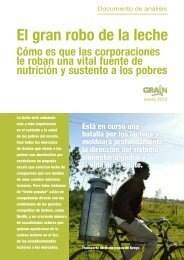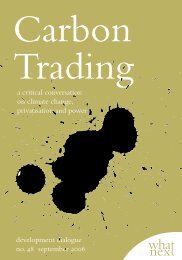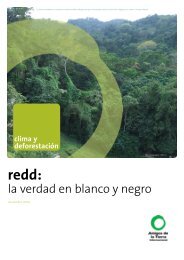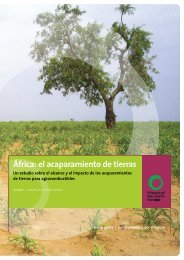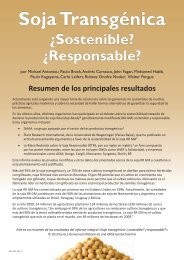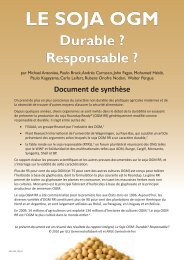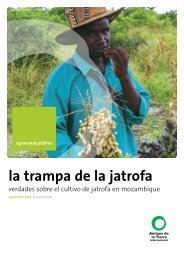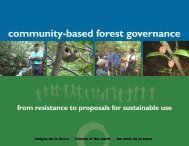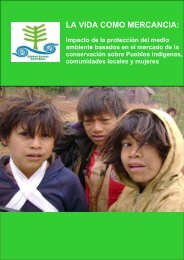Plantations, poverty and power - Critical Information Collective
Plantations, poverty and power - Critical Information Collective
Plantations, poverty and power - Critical Information Collective
You also want an ePaper? Increase the reach of your titles
YUMPU automatically turns print PDFs into web optimized ePapers that Google loves.
38<br />
Swazil<strong>and</strong>’s main industries are sugar <strong>and</strong> forestry. Both require large areas of l<strong>and</strong>. “They are a disaster<br />
for a country like Swazil<strong>and</strong>, where there are still feudal social relations,” said Nhlanhla Msweli of the<br />
Swazil<strong>and</strong> Campaign Against Poverty <strong>and</strong> Economic Inequality (SCAPEI) at a meeting in South Africa in<br />
2003. 161 In a country where the majority of people are l<strong>and</strong>less, industrial tree plantations cover almost 10<br />
per cent of the l<strong>and</strong>. 162<br />
Since 1988, Sappi has owned a majority share in the Usutu Pulp Company. In 1982, negotiations to sell<br />
Usutu to the South African pulp <strong>and</strong> paper company Mondi fell through. Six years later Sappi bought 50<br />
per cent of the Usutu pulp company from Courtaulds <strong>and</strong> a further 30 per cent from CDC. The remaining<br />
20 per cent is held by the Swazil<strong>and</strong> government.<br />
In September 2001, Sappi threatened to close the Usutu pulp mill, unless it could find a way of reducing<br />
costs by US$8.3 million within three months. In 2002, Sappi battled with the Swazil<strong>and</strong> Agricultural <strong>and</strong><br />
Plantation Workers’ Union about laying off 650 people from the pulp mill. Sappi’s then-executive<br />
chairman Eugene van As told investors that Sappi came “fairly close” to closing down the pulp mill. “The<br />
mill is highly competitive, but not with 650 people more than it needs,” van As said. 163<br />
The town of Bhunya was built to house workers at the pulp mill. It is a one company town. As a resident<br />
put it, “If SAPPI closes, this place is a ghost town tomorrow.” 164<br />
When Sappi took over the firm, it employed 2,700 people. Today, Sappi Usutu has outsourced most of its<br />
work. It now employs only 43 people directly. The company employs a further 1,400 people on a contract<br />
basis. 165<br />
A 2004 report by Wally Menne of the South African Timberwatch Coalition, based on interviews with<br />
community members, environmentalists as well as government <strong>and</strong> industry representatives, documents<br />
how industrial tree plantations have damaged ecosystems <strong>and</strong> caused loss of biodiversity. Menne explains<br />
that plantations have been planted on the l<strong>and</strong> with the most productive potential, at the expense of other<br />
agricultural l<strong>and</strong> uses. “The potential benefits of having allowed the area to remain as it was originally<br />
could exceed those derived from the current use,” Menne notes. “Other agricultural l<strong>and</strong> uses that might<br />
otherwise have become established there could possibly have produced greater benefits for the people <strong>and</strong><br />
the natural environment of Swazil<strong>and</strong>.” 166<br />
In July 2006, Sappi’s plantations in Swazil<strong>and</strong> were given the Forest Stewardship Council’s “green” label<br />
161 Nhlanhla Msweli (2003) “Impacts of timber plantations on rural people of Swazil<strong>and</strong>”, Paper delivered at the<br />
‘Timber <strong>Plantations</strong>: Impacts, Future Visions <strong>and</strong> Global Trends’ Conference, Nelspruit, November, 2003<br />
162 Wally Menne (2004) “Timber <strong>Plantations</strong> in Swazil<strong>and</strong>: An investigation into the environmental <strong>and</strong> social impacts<br />
of large-scale timber plantations in Swazil<strong>and</strong>”, Timberwatch Coalition <strong>and</strong> World Rainforest Movement, December 2004.<br />
http://www.wrm.org.uy/countries/Swazil<strong>and</strong>/<strong>Plantations</strong>.pdf<br />
163 “South Africa; Half Of Sappi Shares In The US”, Business Day, 29 January 2002.<br />
164 James Hall (2000) “Swazil<strong>and</strong>: Some traditions harmful to the environment”, Interpress Service, 12 May 2000.<br />
165 “Woodmark Forest Certification Public Report, Sappi Usutu”, Woodmark, Soil Association, July 2006.<br />
http://www.organicweek.org/web/sa/saweb.nsf/librarytitles/22D0E.HTMl/$file/Usutu%20FM%20S1%20report%20FINAL<br />
.xls<br />
166 Wally Menne (2004) “Timber <strong>Plantations</strong> in Swazil<strong>and</strong>: An investigation into the environmental <strong>and</strong> social impacts<br />
of large-scale timber plantations in Swazil<strong>and</strong>”, Timberwatch Coalition <strong>and</strong> World Rainforest Movement, December 2004,<br />
page 24. http://www.wrm.org.uy/countries/Swazil<strong>and</strong>/<strong>Plantations</strong>.pdf



